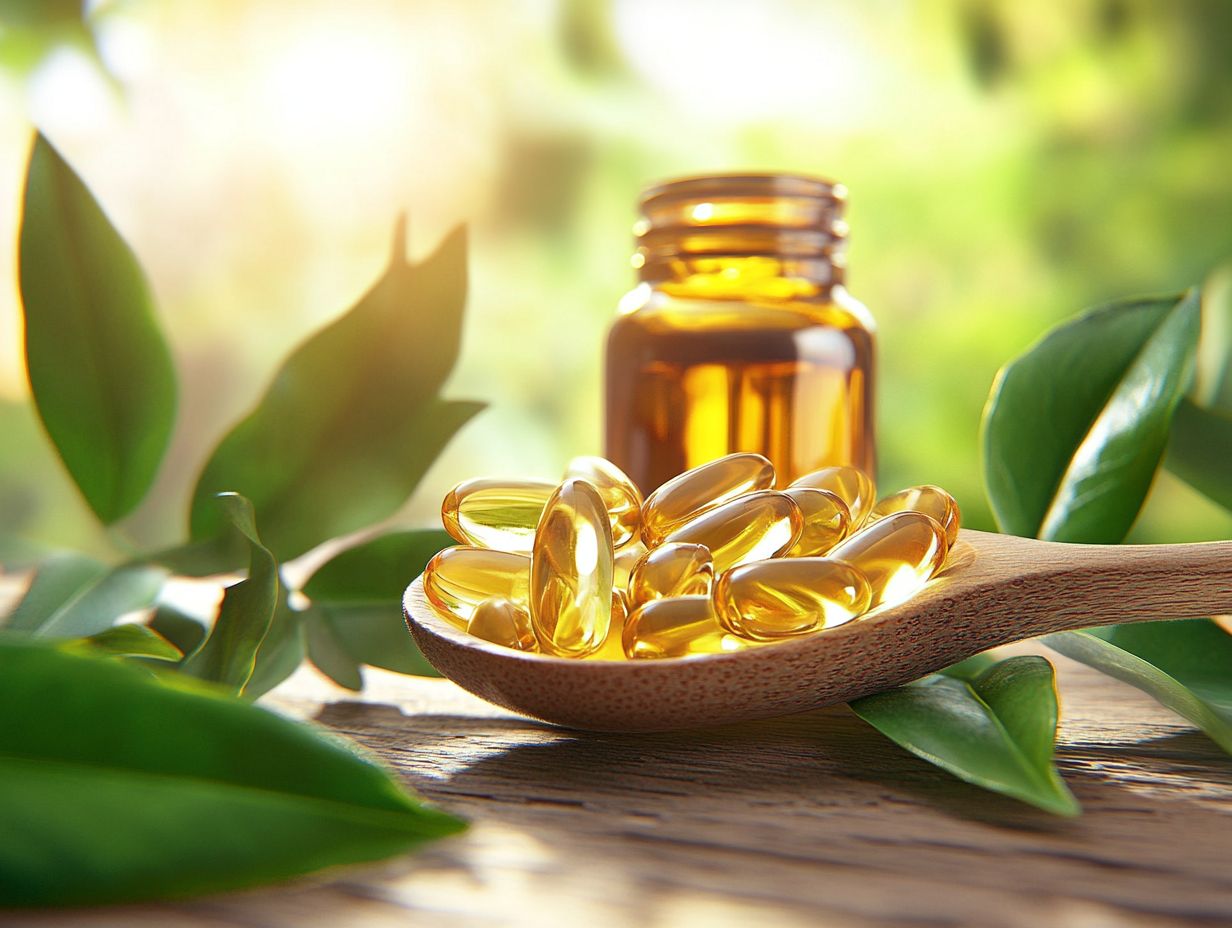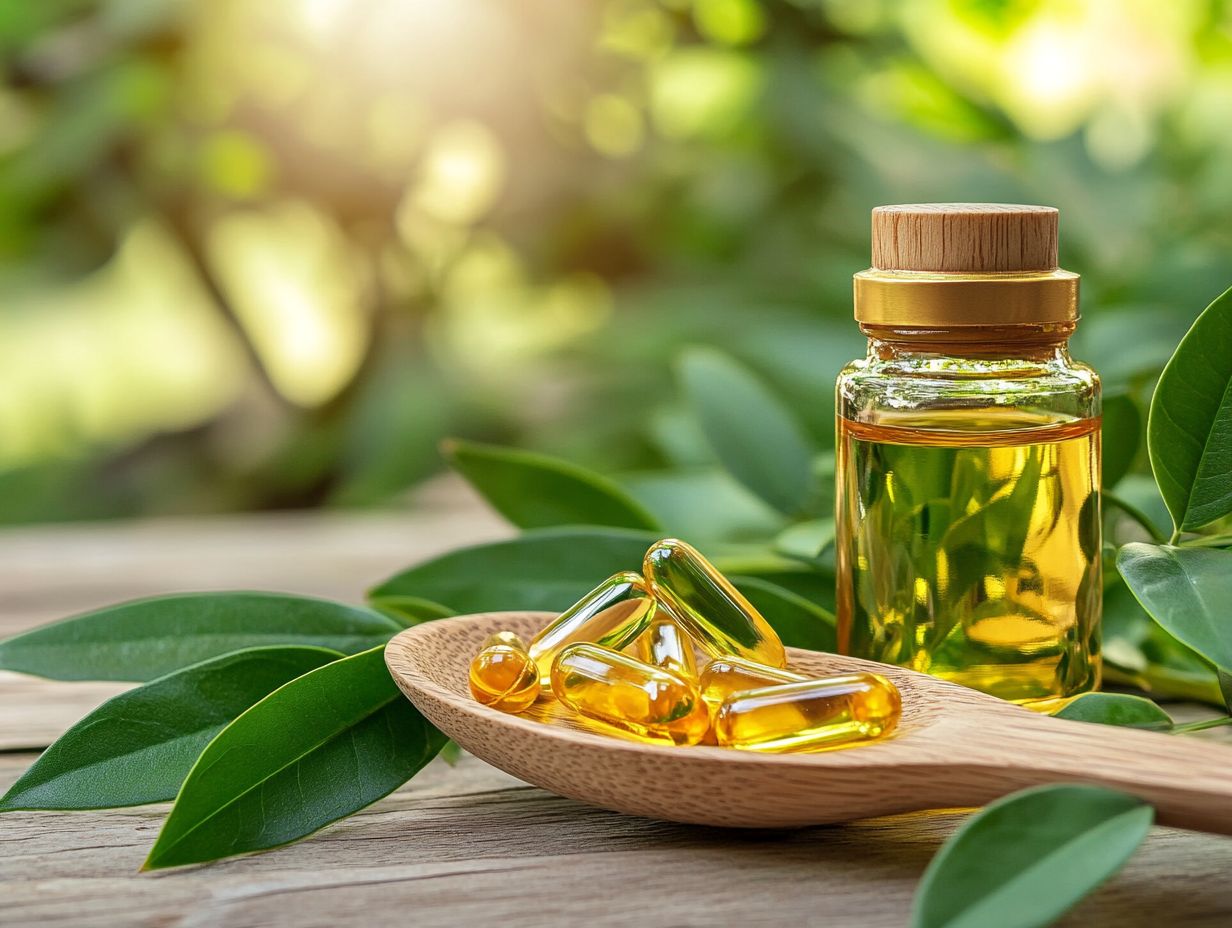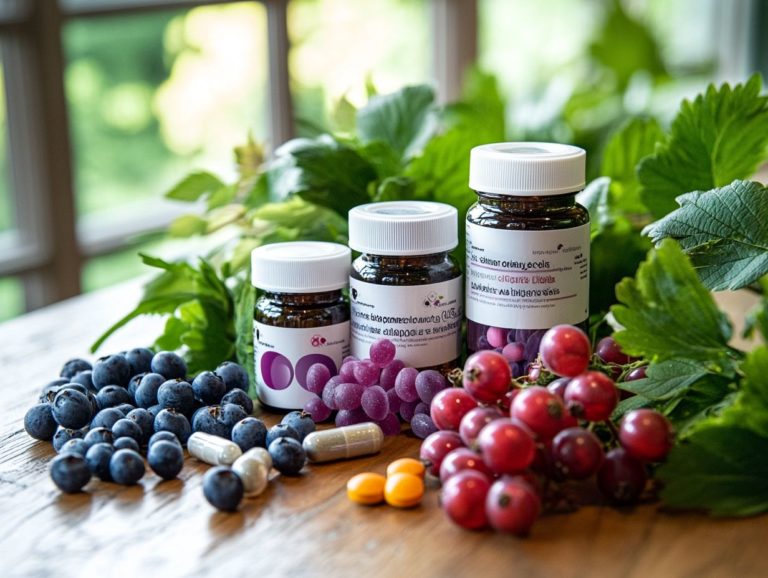5 Benefits of Taking Vitamin E Supplements
Vitamin E is frequently celebrated as a powerhouse nutrient, packed with benefits that can significantly enhance your overall health!
From safeguarding your cells against damage to promoting radiant skin and luscious hair, the advantages of this remarkable vitamin are truly compelling. Get ready to discover five amazing benefits of vitamin E that could transform your health!
This article explores five essential benefits of vitamin E supplements, outlines the optimal dosage, and addresses potential side effects and interactions with other medications.
Whether you’re aiming to bolster your immune function or enhance your eye health, you’ll uncover how integrating vitamin E into your wellness routine can be a pivotal choice for your well-being.
Contents
- Key Takeaways:
- 1. Helps Protect Cells from Damage
- 2. Promotes Healthy Skin and Hair
- 3. May Help with Heart Health
- 4. May Improve Immune Function
- 5. May Help with Eye Health
- How Much Vitamin E Should You Take?
- Frequently Asked Questions
- What are the top 5 benefits of taking vitamin E supplements?
- How should I take vitamin E supplements for the best results?
- Are there any potential risks or side effects of taking vitamin E supplements?
- Can I get enough vitamin E from my diet alone?
- How long does it take to see the benefits of taking vitamin E supplements?
- Can I take vitamin E supplements if I am pregnant or breastfeeding?
- Why should you consider vitamin E supplements?
Key Takeaways:

- Protects cells from damage and boosts overall health.
- Enhances skin and hair health for a youthful appearance.
- Safeguards heart and boosts immune system function.
1. Helps Protect Cells from Damage
Vitamin E is essential for protecting your cells from harmful changes in the body caused by free radicals, a major player in various health issues such as heart disease and cancer, as highlighted by research from the Cleveland Clinic.
This fat-soluble vitamin serves as a robust substance that helps protect your body from damage, neutralizing harmful free radicals and promoting overall cellular health.
In terms of conditions like heart disease and diabetes, vitamin E especially in its alpha-tocopherol form works to shield your cells from oxidative damage, potentially reducing the risk of inflammation and insulin resistance.
By incorporating dietary sources rich in vitamin E, such as almonds, sunflower seeds, and vibrant green leafy vegetables like spinach or kale, you can elevate your nutritional profile while fortifying your body’s defenses against disease. This protective effect highlights the importance of maintaining adequate vitamin E levels through a balanced diet, playing a crucial role in your long-term health and wellness.
2. Promotes Healthy Skin and Hair
Vitamin E is celebrated for its remarkable ability to enhance the health of your skin and hair. This natural antioxidant works tirelessly to combat damage caused by environmental factors like UV radiation and pollution.
By playing a crucial role in maintaining skin hydration, vitamin E enhances moisture retention, leaving your skin feeling incredibly soft and supple. It can also help diminish the appearance of scars and fine lines, contributing to a more youthful complexion.
Incorporating vitamin E into your daily skincare routine is a breeze. Opting for serums or oils rich in this vitamin can deliver a direct boost to your skin’s health. For those seeking to nourish from the inside out, adding foods like nuts, seeds, and green leafy vegetables to your diet can significantly support your skin’s vitality, ensuring a holistic approach to achieving that radiant, healthy glow.
3. May Help with Heart Health
Research suggests that vitamin E might be a valuable ally in promoting heart health by reducing the risk of blood clots and enhancing overall cardiovascular markers.
This essential nutrient works its magic primarily through its antioxidant properties, neutralizing harmful free radicals that can lead to heart disease.
Studies indicate that vitamin E may also play a role in lowering blood pressure by improving vascular function and fostering healthy circulation. It can also reduce inflammation, which is important for heart health.
To keep your heart in top shape, aim for around 15 mg of vitamin E daily it’s easier than you think! Enjoy delicious nuts, seeds, and spinach to hit that target!
4. May Improve Immune Function

Vitamin E is vital for a strong immune system. It supports immune cell function and helps fend off infections and illnesses.
This remarkable vitamin acts as a powerful antioxidant, combating damage to cells caused by unstable molecules. This is especially important as you age and may experience reduced immunity. Research shows that individuals with a vitamin E deficiency are more vulnerable to respiratory infections and other health complications.
For optimal immune function, include vitamin E-rich foods in your daily diet, such as:
- Nuts
- Seeds
- Green leafy vegetables
If you find it challenging to meet your nutrient needs through diet alone, vitamin E supplements can be an effective option. Just be sure to take them under medical supervision, as they may significantly boost your immune health.
5. May Help with Eye Health
Vitamin E could be your ally in promoting eye health, especially in warding off age-related conditions like macular degeneration. Its powerful antioxidant properties play a crucial role.
Research underscores the importance of these antioxidants in reducing damage to cells caused by unstable molecules, a key factor in vision decline. Studies, including those from the Age-Related Eye Disease Study (AREDS), reveal that individuals who incorporate higher levels of vitamin E and other antioxidants into their diets face a lower risk of serious eye diseases.
By adding foods rich in this essential nutrient think almonds, spinach, and sunflower seeds to your meals, you can take a proactive step toward maintaining healthy vision. This nutritional approach not only bolsters your eye health but also enhances your overall well-being.
How Much Vitamin E Should You Take?
Determining the right vitamin E dosage is crucial for reaping its health benefits while avoiding potential toxicity. The Dietary Reference Intake provides specific recommendations based on age and gender.
For instance, if you’re an adult male, you typically need about 15 milligrams per day. Adult females have the same recommendation, but it may be slightly adjusted during pregnancy or lactation to support both mother and child.
Your individual needs might fluctuate due to various factors, such as overall health, lifestyle choices, and specific medical conditions like diabetes or malabsorption syndromes.
While vitamin E is generally considered safe, it’s wise to avoid exceeding the upper limit of 1,000 mg per day. Doing so could lead to potential risks, including bleeding disorders and a weakened immune response. Health professionals often emphasize that a balanced diet rich in nuts, seeds, and green leafy vegetables is the most effective way to meet your nutritional needs without the risks associated with high-dose supplements.
What Are the Different Types of Vitamin E Supplements?
You ll find various vitamin E supplements on the market, with alpha-tocopherol standing out as the most researched and widely embraced for its extensive health benefits.
It s essential to recognize that vitamin E consists of eight distinct compounds, including tocopherols and tocotrienols, each offering unique advantages. For instance, tocopherols, like gamma-tocopherol, are celebrated for their anti-inflammatory properties, while tocotrienols are noted for supporting cardiovascular health and potential cholesterol-lowering effects.
When choosing a vitamin E supplement, reflect on your specific health goals and consult with a healthcare provider. Certain forms might be better suited for particular conditions. For example, if you’re aiming to enhance skin health, tocotrienols could be your best bet, whereas those seeking antioxidant support might find tocopherols more appealing.
What Are the Possible Side Effects of Vitamin E Supplements?

While vitamin E supplements can offer health benefits, it’s important to recognize that they may also have potential side effects and health risks, especially when taken in excessive amounts.
One noteworthy risk involves bleeding. This is particularly concerning for those who consume high doses, especially if they re also taking blood-thinning medications like warfarin. This combination can significantly increase the chances of bruising or more severe bleeding episodes, as vitamin E may inhibit the clumping of blood cells that helps stop bleeding.
It’s essential to stick to the recommended dietary allowances, which generally suggest no more than 15 mg daily for most adults. To navigate potential risks effectively, consider consulting with healthcare professionals before starting vitamin E supplementation. This way, you can balance the benefits with safe consumption practices to avoid any adverse interactions.
Can Vitamin E Supplements Interact with Other Medications?
Vitamin E supplements can interact with certain medications, especially anticoagulants, which may increase the risk of blood clots and impact your overall health management.
This interaction can complicate your treatment regimen if you rely on medications like warfarin or other blood thinners. Vitamin E might enhance their effects and lead to excessive bleeding.
If you re on cholesterol-lowering statins or specific chemotherapy drugs, you could experience altered efficacy when they re combined with vitamin E. Make sure to talk to your healthcare team before considering vitamin E supplementation. This way, you can gain a comprehensive understanding of the potential risks and navigate your healthcare decisions safely.
Who Should Consider Taking Vitamin E Supplements?
Certain individuals, particularly those with vitamin E deficiency or specific health conditions, might find that taking vitamin E supplements enhances their immune system and overall well-being.
For example, older adults often experience a decline in nutrient absorption, making them more vulnerable to deficiencies. Individuals with malabsorption disorders, such as celiac disease or cystic fibrosis, may struggle to obtain sufficient amounts of this essential nutrient through their diet alone.
Those grappling with chronic inflammation may deplete their vitamin E levels more quickly, underscoring the potential need for supplementation. While supplements can provide benefits, dietary sources like nuts, seeds, and leafy green vegetables play a critical role in maintaining balanced nutrition. Emphasizing these foods is key to a holistic approach to health.
How Can One Incorporate Vitamin E into Their Diet?
Incorporating vitamin E into your diet is straightforward when you indulge in a variety of nutrient-rich foods like nuts, seeds, and vibrant green leafy vegetables. This ensures that you’re not just meeting your dietary needs but also elevating your overall health in ways that supplements often can’t replicate.
For instance, almonds and sunflower seeds can be sprinkled on salads or blended into smoothies, enhancing both flavor and nutritional value. You can easily toss spinach and kale into stir-fries or blend them into refreshing green juices, making it simple to boost your vitamin E intake. And let s not forget about avocados their creamy texture makes them perfect for smashing onto toast or blending into dressings, adding healthy fats alongside a wealth of antioxidants.
By focusing on whole foods for your vitamin E sources, you can improve absorption and enjoy the synergistic benefits, all while contributing to a well-rounded diet.
Frequently Asked Questions

What are the top 5 benefits of taking vitamin E supplements?
-
1. Promotes healthy skin:
Vitamin E is an antioxidant. It protects skin from UV damage and improves overall skin health.
-
2. Boosts immune system:
Vitamin E helps produce immune cells. This makes it an important nutrient for maintaining a healthy immune system.
-
3. Improves heart health:
Vitamin E can improve blood flow. It also reduces the risk of heart disease.
-
4. Fights against free radicals:
Free radicals can damage cells and contribute to aging and disease. Vitamin E helps neutralize these harmful molecules.
-
5. Supports eye health:
Vitamin E has been linked to a reduced risk of age-related macular degeneration, a leading cause of vision loss in older adults.
How should I take vitamin E supplements for the best results?
The recommended daily intake of vitamin E is 15 mg for adults. Take supplements with a meal that contains fat. This vitamin dissolves in fat and is better absorbed with dietary fats.
Are there any potential risks or side effects of taking vitamin E supplements?
Vitamin E is generally considered safe. However, taking high doses (over 400 mg per day) may increase the risk of bleeding and interact with certain medications. Always consult with a healthcare professional before starting any new supplement.
Can I get enough vitamin E from my diet alone?
Vitamin E is found in various foods, such as nuts, seeds, vegetable oils, and leafy green vegetables. However, it may be challenging to get enough through diet alone. This is why supplementation can be beneficial.
How long does it take to see the benefits of taking vitamin E supplements?
The effects of vitamin E supplements vary from person to person. They also depend on the dosage and frequency of intake. Consistent use over time is key to experiencing the full benefits of this nutrient.
Can I take vitamin E supplements if I am pregnant or breastfeeding?
It is important to consult with a healthcare professional before taking any supplements during pregnancy or while breastfeeding. While vitamin E is generally safe, high doses may not be recommended during this time.
Why should you consider vitamin E supplements?
Vitamin E offers amazing benefits! Get ready to discover how it can transform your health.
Don’t wait to take charge of your health consider adding vitamin E to your routine!






